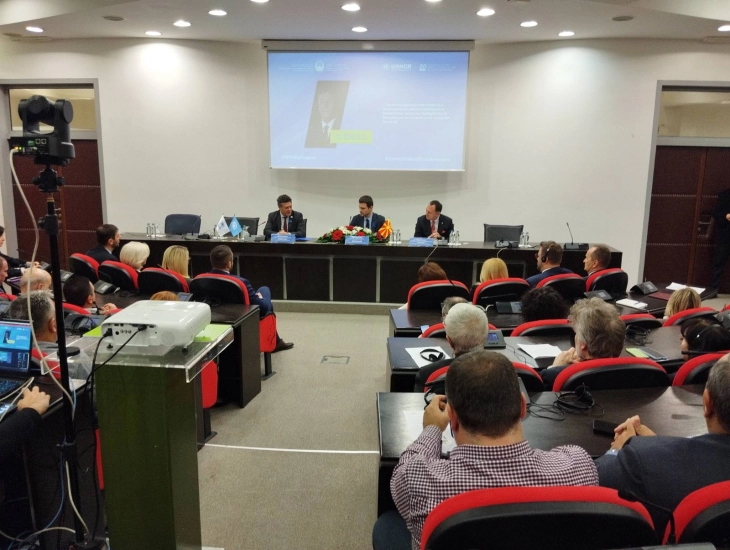30 years of diplomatic relations with UNHCR: Refugee Convention one of UN's most respected human rights instruments
- The Refugee Convention and its Protocol have contributed to protecting millions of people and is one of the most respected human rights instruments of the United Nations. We can show other countries tackling statelessness that solutions can be found and resolved with political will, it was noted at Thursday’s event marking the 30th anniversary of the establishment of diplomatic relations with the Office of the United Nations High Commissioner for Refugees (UNHCR) and the opening of its Skopje offices in 1994.

Skopje, 12 December 2024 (MIA) - The Refugee Convention and its Protocol have contributed to protecting millions of people and is one of the most respected human rights instruments of the United Nations. We can show other countries tackling statelessness that solutions can be found and resolved with political will, it was noted at Thursday’s event marking the 30th anniversary of the establishment of diplomatic relations with the Office of the United Nations High Commissioner for Refugees (UNHCR) and the opening of its Skopje offices in 1994.
A video detailing UNHCR’s activities in the country and recounting refugees’ journeys to securing citizenship was screened at the event, held at the Ministry of Foreign Affairs and Foreign Trade in Skopje.
Minister of Foreign Affairs and Foreign Trade Timcho Mucunski thanked the UNHCR team in the country for their expertise, resources, commitment and guidelines, seen as key to align national policies with international standards, that have contributed to fostering a culture of tolerance and inclusion.
“In the past three decades, our cooperation with UNHCR has been put to the test through numerous challenges. But, the strength of our partnership became evident throughout these moments. We’d worked together to safeguard humanity, dignity and solidarity offering protection, assistance and hope to thousands of refugees, asylum seekers and displaced people seeking safety within our borders. Especially in 1999, in the midst of the Kosovo crisis, we’d shown that even a relatively small country, like ours, could play an important role in advancing humanitarian standards,” said Mucunski in his speech.
Our country, he recounted, was the safe haven to 344,500 refugees, who were given accommodation with the help of international and regional organizations, most notably UNHCR.
“The world recognized us as a small country that successfully tackled the challenges of a large-scale refugee crisis. We were actively involved in efforts securing support to refugees and displaced persons by building an enhanced system for asylum, creation of support and integration programs, opening of access to basic services, such as education, healthcare and creating dignified conditions for them to rebuild their lives. We showed perseverance and adjustability in aligning national policies with the principles of international humanitarian law,” stated Mucunski.

People who have been issued identification documents and citizenship can lead a normal life, said UNHCR Regional Director for Europe, Philippe Leclerc.
No continent is spared from conflicts, including the one we live in and the one we considered a continent where peace is constant, he said. “Now, we’re seeing a conflict of almost three years and running and millions have been displaced within Ukraine and more than six million people have left Ukraine, some have arrived in your country, which provides temporary protection,” Leclerc said.
The Security Council, he stressed, cannot prevent conflicts from happening and cannot find permanent solutions to old conflicts, which have led to 123 million people being forcefully displaces across all continents on planet Earth.
“But, it’s really important to see hope,” he urged.
UNHCR’s support to countries hosting refugees is vital, according to him. “As we’d seen your country during the Bosnia war, when refugees from BiH and Croatia were admitted to this country, when the same thing had happened during the Kosovo crisis, when you offered support to almost million Kosovo citizens offering them temporary protection, when in 2013 countless Syrians had arrived in Greece and at your border before continuing their journey to the rest of Europe, primarily Austria, Germany and the Scandinavian countries. You played a key role and UNHCR supported you in each of these cases advising your legislation and offering support through programs,” he stated.
Leclerc also called on universities, civil society and the private sector to contribute to, as he said, providing an overall social response.
Photo and video: MIA







